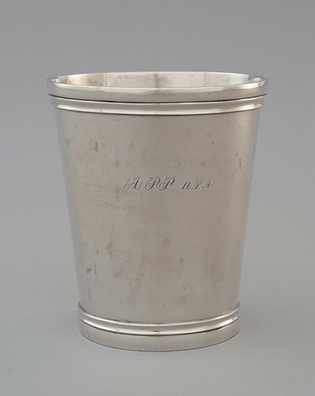 loading
loading
Arts & CultureSilver on the Texas frontierObject lesson: a tumbler with ties to the state’s beginnings. Patricia E. Kane is the Friends of American Arts Curator at the Yale University Art Gallery. The Texas silver is on view until December 10.  William J. Hill collection. The Museum of Fine Arts, Houston; Paul Hester, Hester + Hardaway Photography.One day in the mid-1800s, a cavalry officer from Pennsylvania bought a silver tumbler, nearly four inches tall, in San Antonio, Texas. The cup is a small but concrete link to the history of Texas before secession. View full imageEngraved on the front of this silver tumbler, which was hand wrought on the Texas frontier in the mid-nineteenth century, are the initials of its original owner. Through its owner and its maker, the tumbler has tangible links to the history of the territory that became the state of Texas. The United States annexed the Republic of Texas as a state in 1845. At the conclusion of the Mexican-American War in 1848, Mexico acknowledged the state’s independence. Then, in 1861, Texas seceded from the United States to join the Confederate States of America. Texas’s rich land, suitable for cotton culture and ranching, attracted many immigrants; they were drawn overwhelmingly from Southern slaveholding states and from Germany. Among them was Samuel Bell, a silversmith from Tennessee who came to San Antonio in 1851. One of his creations was this tumbler—a latter-day example of the eighteenth-century camp cups used in military settings. The tumbler’s inscription, “APP USA,” is the clue to the identity of its owner: it very likely stands for “Andrew Parker Porter / United States Army.” Porter (1835–1866) was an 1856 graduate of West Point who came from an important Pennsylvania family. His grandfather was Andrew Porter, a schoolmaster in Philadelphia who served with distinction in the Revolution; later, he was secretary of war under James Madison. Andrew Parker Porter’s father, James Madison Porter, was a judge in Easton, a founder of Lafayette College, and secretary of war under John Tyler. Like his forebears, Andrew Parker Porter took part in national events of his day. He was first assigned to the Second United States Cavalry, established to secure the vast new Texas territory acquired after the successful conclusion of the Mexican–American War. The territory was inhabited by Indians, particularly the Comanche, who did not welcome its new owners. In his cavalry unit, Second Lieutenant Porter participated in Indian scouting missions. His first postings were in the vicinity of San Antonio, which was an essential source of supplies for the army in south central Texas. Parker would have acquired his tumbler, and had his initials engraved on it, at Bell’s shop in San Antonio sometime between 1856 and 1861. After Texas seceded from the Union, Porter was appointed assistant commissary general of the Union Army of the Potomac. Later, he was promoted to command the Army of the Southwest. He died in Little Rock, Arkansas, in 1866. Porter’s tumbler is one of 27 pieces of Texas silver lent by Houston businessman and philanthropist William J. Hill to the Yale University Art Gallery and currently on exhibit. Among them are two other camp cups, engraved with their owners’ names. One, also made by Bell, belonged to Captain Alfred Gibbs, (1823–1868), a West Point–educated soldier who served with distinction in the Mexican-American War and fought for the Union in the Civil War. The other was made by F. S. Adolph Bahn, a German silversmith who had a shop in Austin. This tumbler belonged to Alexander W. Terrell (1827–1912), a Virginia-born Austin lawyer who served as a colonel with the 37th Regiment of the Texas Cavalry during the Civil War. The contents of the cups must have provided moments of relief during dangerous assignments. We can imagine, too, that these silver vessels brought an element of refinement to their owners’ lives in the harsh and challenging environment of the frontier.
The comment period has expired.
|
|